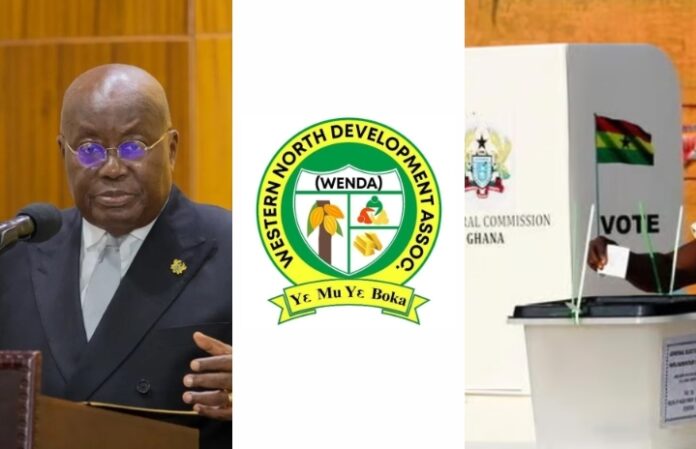The President of the Western North Development Association (WENDA Ghana), Dr. Tony Tsina Addai, has petitioned President Nana Addo Dankwa Akufo-Addo for a fundamental change in the process of appointing Metropolitan, Municipal, and District Chief Executives (MMDCEs) and Regional Ministers.
Dr. Addai’s petition underscores the critical need for elected representation at the local level, citing compelling reasons why MMDCEs and Regional Ministers should be chosen through popular vote rather than presidential appointment.
Among these reasons are increased accountability, representation, democratic principles, reduced political interference, and improved local development.
The proposal highlights the advantages of elected officials being more responsive to the needs of their constituents, fostering competition and innovation, promoting good governance practices, and empowering local communities to have a direct role in shaping their future.
Furthermore, Dr. Addai emphasizes the importance of decentralizing decision-making, promoting meritocracy, fostering inclusivity and diversity, and strengthening democratic institutions at the grassroots level.
He argues that transitioning MMDCEs and Regional Ministers to elected positions will revitalize central government accountability and deepen democracy in Ghana.
While acknowledging the potential challenges associated with electoral reform, Dr. Addai asserts that the benefits far outweigh the risks.
He contends that empowering local communities through elected representation will ultimately strengthen the fabric of Ghana’s democracy and ensure that government officials are directly accountable to the people they serve.
Below is the full petition
SOME OF THE REASONS WHY MMDCEs and REGIONAL MINISTERS SHOULD BE ELECTED ARE AS FOLLOWS:
1. Increased Accountability: When MMCEs, DCEs, and Regional Ministers are elected by the people, they are more accountable to their constituents as they have to answer to them during elections. This can lead to more transparent and responsive governance.
2. Representation: Elected officials have a mandate from the people they represent, which means they are more likely to prioritize the needs and interests of their constituents. This can lead to better decision-making and policies that reflect the desires of the people.
3. Democratic Principles: Electing MMCEs, DCEs, and Regional Ministers aligns with democratic principles of government by giving power to the people to choose their representatives. This can help to strengthen democratic institutions and promote civic engagement.
4. Competition and Innovation: Elections create competition among candidates, leading to a wider range of ideas and approaches to governance. This can foster innovation and result in better outcomes for the community.
5. Reduced Political Interference: When officials are appointed by the President, there is a risk of political interference and patronage appointments. By electing MMCEs, DCEs, and Regional Ministers, the process becomes more transparent and less susceptible to political manipulation.
6. Improved Local Development: Elected officials are more likely to prioritize the development needs of their communities, leading to more effective and sustainable local development initiatives. This can help to address issues such as infrastructure, education, and healthcare at the local level.
7. Enhanced Legitimacy: Elected officials have a stronger mandate from the people, which enhances their legitimacy and credibility in governing. This can help to build trust between the government and the public, leading to more effective governance.
8. Local Empowerment: By electing MMCEs, DCEs, and Regional Ministers, local communities have a greater say in who represents them and makes decisions on their behalf. This empowers communities to have a direct role in shaping their own future and development.
9. Alleviating Centralized Power: Currently, the President appoints these officials which can lead to a concentration of power at the center. Electing MMCEs, DCEs, and Regional Ministers can help to decentralize decision-making and empower local governments to address the unique needs of their communities.
10. Promotion of Meritocracy: Through the electoral process, candidates for these positions have to compete based on their qualifications, experience, and vision for governance. This can promote a more meritocratic system where the best candidates are elected based on their abilities rather than political connections.
11. Institutional Strengthening: Electing MMCEs, DCEs, and Regional Ministers can help to strengthen local government institutions and build capacity at the local level. This can lead to more efficient and effective service delivery and governance in the long run.
12. Independence and Autonomy: Elected officials have a degree of independence and autonomy that appointed officials may lack. This independence allows them to make decisions that are in the best interest of their constituents, without being overly influenced by the President or other political figures.
13. Representation of Diverse Views: Through the electoral process, MMCEs, DCEs, and Regional Ministers are able to represent a broader range of views and interests within their communities. This diversity can lead to more inclusive decision-making and policies that benefit a wider range of people.
14. Encourages Civic Participation: Elections for local government officials can help to engage citizens in the political process and encourage them to participate in governance. This can lead to a more informed and active citizenry that is invested in the development of their communities.
15. Promotes Good Governance: Elected officials are accountable to the people they serve, which can incentivize them to govern more effectively and responsibly. This can help to promote good governance practices, reduce corruption, and improve the overall quality of public administration.
16. Increased Transparency and Accountability: Elected officials are accountable to the electorate and must regularly report on their activities and decisions. This transparency can help to prevent corruption and mismanagement of resources, as officials are held responsible for their actions by the voters.
17. Improved Service Delivery: Elected officials are more likely to be responsive to the needs of their constituents, as they rely on their support for re-election. This can lead to improved service delivery and better implementation of development projects at the local and regional level.
18. Encourages Competition and Innovation: Elections create a competitive environment where candidates need to present their vision and plans to the voters. This can spur innovation, as candidates may propose new ideas and approaches to governance in order to differentiate themselves from their opponents.
19. Democratic Values: Electing MMCEs, DCEs, and Regional Ministers aligns with democratic principles by giving citizens a direct role in choosing their representatives. This promotes a culture of democracy and participation in governance, which is essential for the overall health of the political system.
20. Strengthening Local Democracy: By electing local government officials, Ghana can strengthen its democratic institutions at the grassroots level. This can enable communities to have a greater voice in decision-making processes and contribute to the overall development and welfare of the country.
21. Enhanced Legitimacy: Elected MMCEs, DCEs, and Regional Ministers have a stronger mandate from the people, as they are chosen through a democratic process. This legitimacy can increase public trust in the government and its representatives, leading to more effective governance and policy implementation.
22. Local Representation: Electing local government officials allows for better representation of the specific needs and issues of different regions and communities. Elected officials are more likely to understand and prioritize the concerns of their constituents, leading to tailored development initiatives that address local challenges.
23. Promotion of Local Democracy: Electing MMCEs, DCEs, and Regional Ministers can empower local communities to participate in decision-making processes and have a say in matters that directly affect their daily lives. This decentralization of power can strengthen local democracy and foster a sense of ownership and engagement among citizens.
24. Professionalism and Competence: Through an electoral process, candidates for MMCEs, DCEs, and Regional Ministers are evaluated based on their qualifications, experience, and abilities. This can result in the selection of individuals who are more competent and capable in performing their duties, leading to improved governance and administration at the local and regional levels.
25. Long-term Planning and Stability: Elected officials have a longer-term perspective as they need to consider the interests of their constituents over multiple electoral cycles. This can lead to more sustainable development planning and policies that prioritize the long-term well-being of the region, rather than short-term political considerations.
26. Inclusivity and Diversity: Electing MMCEs, DCEs, and Regional Ministers allows for a more diverse representation of the population, including women, youth, minority groups, and marginalized communities. This can ensure that a wider range of perspectives and voices are heard in decision-making processes, leading to more inclusive and equitable governance.
27. Checks and Balances: Elected officials serve as a check on executive power and provide a counterbalance to the authority of the President. By electing MMCEs, DCEs, and Regional Ministers independently, it can help prevent the concentration of power in the hands of a single individual and promote a system of checks and balances within the government.
28. Citizen Engagement and Participation: Elections for MMCEs, DCEs, and Regional Ministers can mobilize citizens to participate in the democratic process, increasing political engagement and awareness within the population. This can lead to a more informed and empowered citizenry that actively engages with governance issues and holds their elected officials accountable.
29. Flexibility and Adaptability: Elected officials have the flexibility to respond to changing circumstances and priorities, as they are directly accountable to the electorate. This adaptability can result in more responsive and dynamic governance that can address emerging challenges and opportunities in a timely manner.
30. Strengthening Democratic Institutions: By electing MMCEs, DCEs, and Regional Ministers, Ghana can strengthen its democratic institutions and create a more robust system of governance that is responsive to the needs and aspirations of its citizens. This can contribute to the overall stability and sustainability of the political system.
31. Increased Accountability: Elected MMCEs, DCEs, and Regional Ministers are directly accountable to the people who elected them. This accountability ensures that they are more responsive to the needs and concerns of the electorate, as they can be held accountable through the electoral process.
32. Strengthened Local Governance: Electing MMCEs, DCEs, and Regional Ministers can strengthen local governance structures by decentralizing power and decision-making authority. This can lead to more efficient and effective delivery of services at the local level, as decisions are made by individuals who have a direct connection to the communities they serve.
33. Fostering Competition and Innovation: Electoral competition among candidates for MMCEs, DCEs, and Regional Ministers can spur innovation and drive improvements in governance. When candidates compete for votes based on their platforms and ideas, it can lead to a more dynamic and competitive political landscape that encourages creativity and innovation in governance strategies.
34. Promoting Good Governance Practices: Elected officials are more likely to adhere to good governance practices, such as transparency, accountability, and inclusivity, as they are accountable to the electorate. This can promote a culture of good governance and ethical leadership within local and regional government institutions.
35. Enhancing Democratic Values: Holding elections for MMCEs, DCEs, and Regional Ministers reflects and reinforces the democratic values of participation, representation, and accountability. This can contribute to the development of a more vibrant and inclusive democracy in Ghana, where the voices and choices of the people are central to the decision-making process.
36. Legitimacy and Mandate: Elected MMCEs, DCEs, and Regional Ministers possess a democratic mandate from the people, which enhances their legitimacy and authority to govern. This democratic legitimacy can strengthen their ability to make decisions and implement policies effectively, as they have the backing of the electorate.
37. Local Empowerment and Representation: Electing MMCEs, DCEs, and Regional Ministers allows for a more direct representation of local interests and priorities. Elected officials are more likely to understand and advocate for the needs of their constituents, leading to policies and initiatives that are tailored to the specific needs of each region or locality.
38. Reducing Political Patronage: Appointments by the President can sometimes be influenced by political patronage, favoritism, or nepotism. By electing MMCEs, DCEs, and Regional Ministers, there is a reduced risk of such practices, as candidates are selected based on their qualifications, platforms, and the will of the voters rather than political connections.
39. Encouraging Civic Engagement: Elections for MMCEs, DCEs, and Regional Ministers can stimulate civic engagement and political participation at the local level. Citizens are more likely to engage with local governance issues, participate in electing their representatives, and actively contribute to decision-making processes when they have a direct stake in the outcome.
40. Strengthening Democracy: Ultimately, electing MMCEs, DCEs, and Regional Ministers contributes to the deepening of democracy in Ghana by ensuring that decision-makers are accountable, representative, and responsive to the people they serve. This further strengthens democratic institutions and fosters a culture of active citizenship and democratic participation in the country.
41. Revitalizing Central Government Accountability: By transitioning MMCEs/DCEs and Regional Ministers to elected officials, we introduce a dynamic that holds the central government accountable for addressing development concerns within specific regions, municipalities, or districts. Failure to engage effectively in addressing these issues could potentially lead to a decline in the popularity of the central government among the populace. However, we all know that no government wants to be unpopular in an area.




